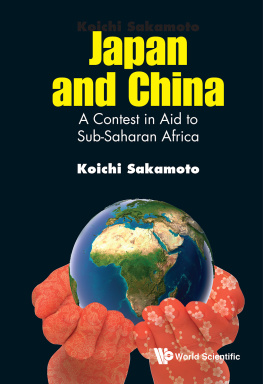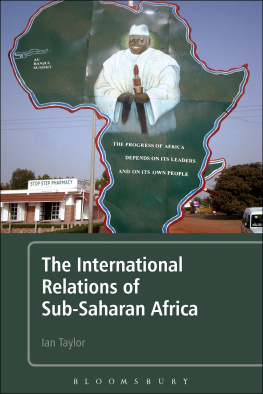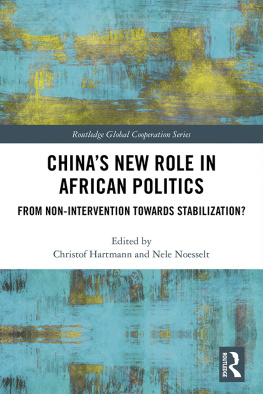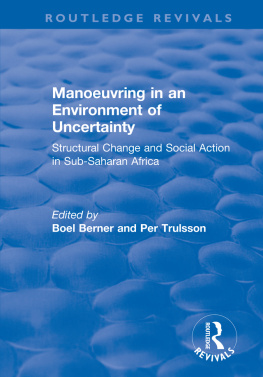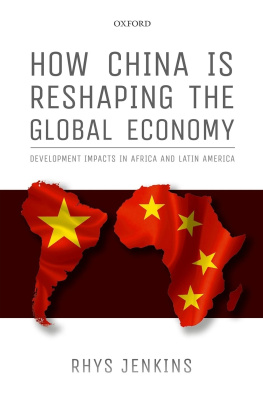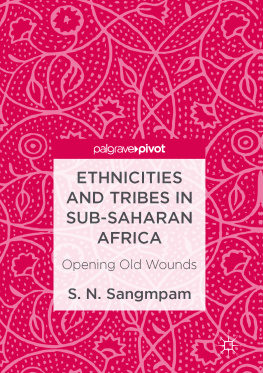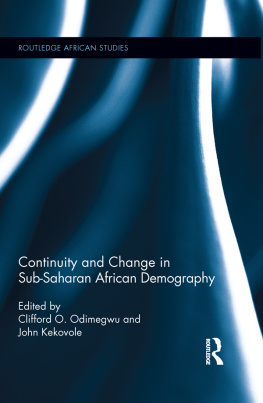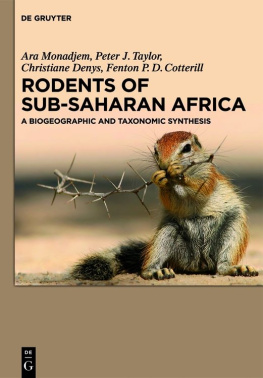Published by
World Scientific Publishing Co. Pte. Ltd.
5 Toh Tuck Link, Singapore 596224
USA office: 27 Warren Street, Suite 401-402, Hackensack, NJ 07601
UK office: 57 Shelton Street, Covent Garden, London WC2H 9HE
Library of Congress Cataloging-in-Publication Data
Names: Sakamoto, Koichi, 1953 author.
Title: Japan and China : a contest in aid to Sub-Saharan Africa / Koichi Sakamoto.
Description: Hackensack, New Jersey : World Scientific, 2018. |
Includes bibliographical references and index.
Identifiers: LCCN 2017049101 | ISBN 9789813223738 (hardcover)
Subjects: LCSH: Economic assistance, Japanese--Africa, Sub-Saharan. | Economic assistance, Chinese--Africa, Sub-Saharan. | Africa, Sub-Saharan--Economic conditions. | Africa, Sub-Saharan--Foreign economic relations--Japan. | Africa, Sub-Saharan-- Foreign economic relations--China. | Japan--Foreign economic relations--Africa, Sub-Saharan. | China--Foreign economic relations--Africa, Sub-Saharan.
Classification: LCC HC800 .S238 2018 | DDC 338.91506--dc23
LC record available at https://lccn.loc.gov/2017049101
British Library Cataloguing-in-Publication Data
A catalogue record for this book is available from the British Library.
Copyright 2018 by World Scientific Publishing Co. Pte. Ltd.
All rights reserved. This book, or parts thereof, may not be reproduced in any form or by any means, electronic or mechanical, including photocopying, recording or any information storage and retrieval system now known or to be invented, without written permission from the publisher.
For photocopying of material in this volume, please pay a copying fee through the Copyright Clearance Center, Inc., 222 Rosewood Drive, Danvers, MA 01923, USA. In this case permission to photocopy is not required from the publisher.
For any available supplementary material, please visit http://www.worldscientific.com/worldscibooks/10.1142/10539#t=suppl
Desk Editor: Jiang Yulin
Typeset by Stallion Press
Email:
Printed in Singapore
Introduction
In December 2015, at a conference hall in Johannesburg, South Africa, Xi Jinping, President of China, was in front of heads of state and top officials from 50 countries of the African continent. The African leaders were invited to attend a summit meeting of the Forum on China-Africa Cooperation (FOCAC), which has been held at the ministerial level every three years since 2000. Xi surprised the audience and the media by pledging 60 billion U.S. dollars in the coming three years.
Eight months later, in August 2016, Shinzo Abe, the Prime Minister of Japan, was in Nairobi, Kenya, to attend a summit meeting of the Tokyo International Conference on African Development (TICAD). Addressing the heads of state and top officials of the 50 African states, he pledged 30 billion U.S. dollars over three years. The amount seemed smaller than that of China, but he had also pledged 32 billion U.S. dollars at the last TICAD in Yokohama, Japan, in 2013.
The latest Japanese meeting, to which the heads of state have been invited since 1993, was the first such gathering in three years. This three-year interval is the same as that for FOCAC. In addition, this meeting was held for the first time in Africa. FOCAC had been alternatively held in China and Africa since its first meeting in 2000.
The two leaders were rivals within the context of a chilly relationship between Japan and China. Xi was elected General Secretary of the Communist Party in November 2012. Abe was elected Prime Minister in December of the same year. Their elections came soon after the serious rioting in 50 cities in China, where rioters were protesting the nationalization of disputed islands by the government of Japan in September.
Overtaking Japan in economic size in 2010, China became the second-largest economy after the U.S. and is currently a major emerging donor for African development. Japan, as a member of the Group of 7 (G7) and of the Development Assistance Committee (DAC) of the Organization for Economic Co-operation and Development (OECD), has had a long history of aid to Africa, too. These two Asian economic giants have been competing on many fronts, including political and economic ones, in recent years. As both leaders may stay in power until the early 2020s, it is important to understand their contest in aid to Africa.
Chinas overwhelming presence in Africa has been a hot issue when one thinks about economic development in the continent and relationships with donors. There has been much coverage in newspapers, magazines, reports and analyses on Chinas massive intervention in African economic and political affairs. Special attention is paid to Chinas activities because its intervention, especially with regard to aid to Africa, has been different from that of Western countries.
This intervention has looked like a threat even to experts at the OECD and the Agence Franaise de Dveloppement (AFD, French Development Agency) whom I met in Paris from 2010. Paying attention to the differences in Chinas aid, they showed their strong disapproval of the massive Chinese investment in Africa outside the aid system, which had been designed with enormous efforts for reform by Western donors.
On the contrary, Chinese scholars and researchers whom I met in Beijing, Tianjin, and Shanghai every year from 2008 onward were proud of their march to Africa during the period. However, they were curious about Western criticism regarding their endeavors to develop Africa. By the time during my visit to China in May 2017, they had become confident about their contribution to African development and the international community. It is also true that the Chinese had taken into account international standards and codes for foreign aid by that point.
Japan has tried to be a Western donor with the passive (to some extent) assimilation of aid reforms led by European countries after the end of the Cold War in the early 1990s. China, as a follower of Japans development approach, paid attention to Japans policies for aid to developing countries, including African ones.
In this context, the objective of this publication is to conduct a brief survey of aid to Sub-Saharan Africa (SSA) by Japan and China and make some projections until the early 2020s about how such aid will develop. The independent analyses will be followed by comparisons of aid to Sub-Saharan Africa by the two Asian giants. Analytical methods include a literature survey and some data analyses. Thorough reviews of statements by both governments are made. Some analyses are conducted on the overall economic development in the two countries (e.g., the surge of Chinas economic power and Japans Abenomics), their aid policies, and aid reforms by DAC countries.
In addition to a literature survey, basic empirical analyses are conducted based on statistics on their aid and economies. Aid is analyzed in the context of overall economic cooperation composed of official aid and private investment. The analyses on China are supplemented by the authors interviews with Chinese scholars and experts as well as Western experts of the OECD and the AFD. Short surveys of some African countries will be presented, but a cross-country analysis occupies the central part of this book.

